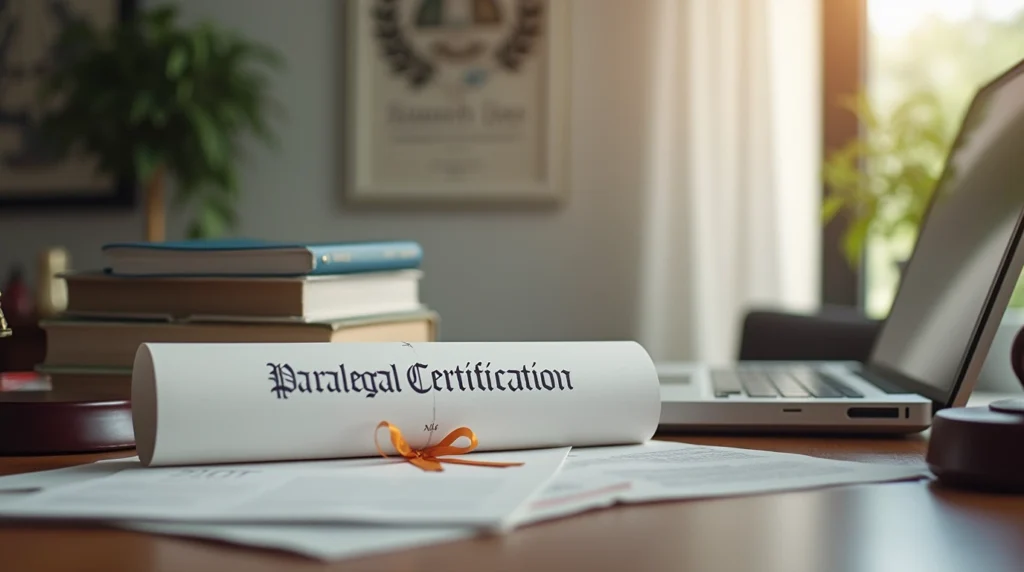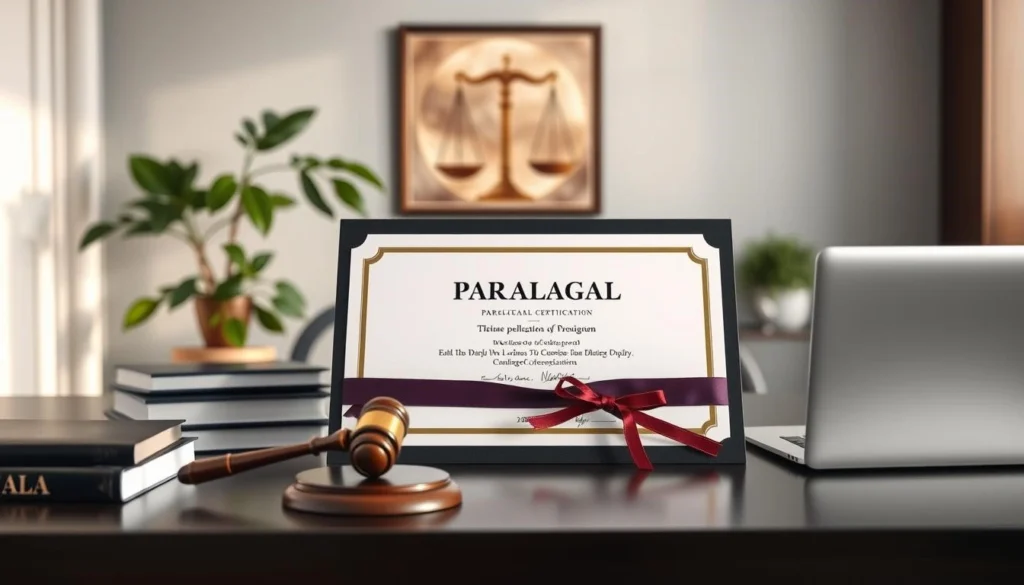Starting a career as a paralegal is both exciting and rewarding. The NALA Paralegal Certification credential is the top mark of your skills and professionalism. With over 45 years of experience, NALA is the leading name in paralegal certification in the U.S. It offers a respected credential that law firms, corporations, and the legal world recognize. NALA doesn’t just offer a prestigious certification. It also supports its members with free educational resources. Members get one free webinar every quarter, helping with ongoing learning and growth. Plus, NALA honors outstanding paralegals with its awards program.
Getting the NALA CP certification can boost your career and pay. Certified paralegals often make 20-25% more than non-certified ones. This shows you’re more skilled and professional, making you a top choice for legal jobs like Paralegal, Corporate Paralegal, Litigation Assistant, and Real Estate Paralegal. If you’re new to paralegal work or already experienced, the NALA Certified Paralegal credential is your key to success. Start this journey and open doors to new career opportunities that will take you to new heights.
Table of Contents
What’s the NALA Paralegal Certification, Anyway?

The Certified Paralegal (CP) credential comes from the National Association of Legal Assistants, or NALA. They’ve been around since 1975, and they’re a big deal—think of them as the folks who set the bar for paralegals across the U.S. The CP isn’t just a pat on the back. It’s a way to show you’ve got the skills—legal research, drafting documents, understanding ethics—and the know-how to back up attorneys in real cases. It’s accredited by the National Commission for Certifying Agencies (NCCA) since 2014, which means it’s legit, not some fly-by-night certificate.
I remember when I first heard about it. I was working as a legal assistant, filing papers and chasing deadlines, wondering if I’d ever get past the grunt work. A colleague mentioned NALA, and I dug into it. Turns out, it’s not just for newbies—it’s for anyone who wants to prove they’re serious about this job.
NALA Paralegal Certification: Why Bother with It?
Let’s be real: the legal field is crowded. There are tons of paralegals out there, and a lot of them have degrees or certificates from local programs. So how do you get noticed? The CP is your edge. Firms—big ones, small ones, corporate offices—they recognize it. Data I’ve seen suggests certified paralegals can make 14-25% more than those without it. That’s not pocket change. For me, getting certified meant a bump from $45,000 to $55,000 a year within months. It’s not guaranteed, but it happens.
More than money, though, it’s about doors opening. You’re not just another resume in the pile—you’re someone who’s passed a tough exam and shown they can handle the heat. Plus, if you’re eyeing leadership roles or specialized gigs (like litigation or real estate), this is a stepping stone. Some folks even use it to jump into advanced certifications, like the ACP, which lets you focus on niches like family law or eDiscovery.
NALA Paralegal Certification: Who Can Go For It?

Here’s where it gets flexible, which I love. NALA doesn’t lock you into one narrow path. You’ve got options, depending on where you’re at in life:
- Got a bachelor’s degree in anything? Pair it with one year of paralegal experience, and you’re in.
- Finished a paralegal program approved by the American Bar Association (ABA)? You’re good to go.
- Just a high school diploma? You’ll need seven years of solid paralegal work under an attorney—tough, but doable.
- Some mix of education and experience? NALA might still let you apply if you make your case.
I went the bachelor’s route. I had a history degree—useless for law, I thought—until I logged a year at a small firm doing research and drafting. That was enough. If you’re starting out, check your local program. Some paralegal courses are NALA-approved and cut the experience requirement down . Point is, there’s a way in for most people willing to put in the work.
NALA Paralegal Certification: Breaking Down the Exam
The CP exam isn’t a cakewalk, and it shouldn’t be. It’s split into two parts, and you’ve got to pass both to earn the title.
- Knowledge Exam
This is the brainy stuff. It’s about 140 multiple-choice questions (some aren’t scored, just there to test new material), and you’ve got three hours. It covers the U.S. legal system, ethics, research, and a bunch of law areas—contracts, civil litigation, criminal law, you name it. I remember sweating over the ethics section—questions about avoiding unauthorized practice of law (UPL) tripped me up until I studied the NALA Code of Ethics. You get results right away, which is nice—no waiting around wondering if you bombed. - Skills Exam
This one’s practical. You’ve got two hours to tackle a real-world task—like writing a memo, drafting a complaint, or answering interrogatories. It’s online, offered four times a year (February, April, July, October), and it tests if you can do the job, not just talk about it . My first try, I froze on a discovery document. Second time, I practiced until I could write one in my sleep. You need precision here—messy work won’t cut it.
Pass rates sit around 68%, so it’s challenging but not impossible. If you fail, you can retake it after 90 days. Fees add up, though—about $125 per section if you’re a NALA member, more if you’re not. Prep is everything.
NALA Paralegal Certification: How to Prep Like You Mean It
I’ll level with you: this isn’t something you cram for in a weekend. Most people I know spent 100-250 hours studying over 3-6 months. That’s a grind, but it’s worth it. Here’s what worked for me and others I’ve talked to:
- NALA Resources: Their study guide and practice exams are gold. I used the online courses too—pricey at $300-$800, but they break it down .
- Old Textbooks: If you’ve got paralegal books lying around, crack them open. I revisited my legal research notes and it saved me.
- Practice: For the Skills Exam, write sample documents. Time yourself. Get feedback if you can—an attorney friend helped me spot sloppy citations.
- Study Groups: Some swear by them. I preferred solo, but bouncing ideas off others can catch your weak spots.
- Schedule It: Life’s busy. I blocked off two hours a night, five days a week. Consistency beats panic every time.
One paralegal I know, Maria, failed her first shot because she winged it. Second time, she treated it like a job—daily practice, no shortcuts. She passed with room to spare . That’s the mindset you need.
NALA Paralegal Certification: The Cost—and the Payoff
Let’s talk numbers. Applying costs $250 if you’re a NALA member, $325 if not. Study materials can run $300-$800, depending on how deep you go. Time? That’s the big one—hundreds of hours you could’ve spent elsewhere. Is it worth it? For me, yes. My salary jumped, and I landed a gig at a bigger firm within a year. Industry stats back this up—certified paralegals often earn $10,000-$15,000 more a year . That’s a quick return on investment.
Beyond cash, it’s about confidence. Walking into a room knowing you’ve got a credential attorneys respect—it changes things. Clients notice too. And if you stick with NALA, you get perks: free webinars, a job board, networking. It’s not just a test; it’s a community.
NALA Paralegal Certification: Keeping It Alive

Once you’ve got the CP, it’s yours for five years. Then you renew with 50 hours of continuing legal education (CLE)—five of those in ethics—plus a fee and a clean record (no felonies) . It sounds like a hassle, but it’s not. NALA offers CLE options, and plenty of providers do too. I knock mine out with online courses and local seminars. It keeps you sharp—laws change, and you can’t coast on old knowledge.
NALA Paralegal Certification: Is It Right for You?
Not everyone needs this. If you’re happy where you are, doing solid work, maybe it’s overkill. But if you’re hungry—if you want more money, more respect, more options—the NALA Paralegal Certification is a no-brainer. I’ve seen it transform careers. Sarah, a friend who got her ACP in eDiscovery, went from $50,000 to $61,000 in months. Maria Chen, a litigation paralegal, says it opened doors she didn’t know existed . Me? It got me out of a rut and into a role I love.
The path’s not easy. It takes time, money, and grit. But that’s the point—anything worth having does. If you’re ready to dig in, start at nala.org. Get your eligibility sorted, set a study plan, and go for it. You won’t regret it.
Conclusion
The NALA Paralegal Certification isn’t just a credential—it’s a ticket to a better career. It proves you’ve got the goods, opens doors, and pays off in ways you can measure (salary) and ways you can’t (confidence). Whether you’re fresh out of school or years into the grind, it’s a chance to stand out. The exam’s tough, the prep’s long, but the reward? That’s yours to keep. Take it from someone who’s been there: this is how you make it in this field.
FAQ
What is the NALA Paralegal Certification?
It’s a credential from NALA that proves your skills and knowledge as a paralegal through a tough two-part exam.
How hard is the NALA Paralegal Certification exam?
Pretty challenging—68% pass rate. It tests legal knowledge and practical skills, so prep (100-250 hours) is key.
How do I maintain my NALA Certification?
To maintain your NALA Certification, you must complete 50 hours of continuing legal education (CLE) every five years, including at least 5 hours in legal ethics.


3 thoughts on “NALA Paralegal Certification – Your Path to Success in 2025”